Age of Wonders 4 preview: a gateway to unlimited variety

During my time with Age of Wonders 4’s preview build, I played as a tribe of knowledge-seeking Felines I based on my own cats, as a troop of cold-blooded Toads with earth-shattering powers I ripped from a popular fantasy franchise (I was just following the Great Plan), a bunch of Elves in league with the undead, and an empire of nature- and war-loving Human cannibals – all of these factions are products of Age of Wonder 4’s powerful race builder and made for very distinct playthroughs.
Developed by Triumph Studios and published by the grand masters of grand strategy, Paradox Interactive, it’s no wonder that this new entry in the popular turn-based 4X franchise is filled with almost unlimited variety. In the first step of faction creation, you choose a race (all the usual suspects plus welcome additions like Toads, Ratpeople, and even Molepeople) and imbue it with a physical and a mental attribute to lay the foundations. Afterwards, you choose a culture type – are they a regular feudal society or perhaps one based around dark magic? – and further expand it by picking two traits that offer various gameplay bonuses as well as your starting tome of magic. The last step is customizing your leader and your faction’s appearance. There are plenty of options in all these categories and all of them will have an impact on how your game plays out.
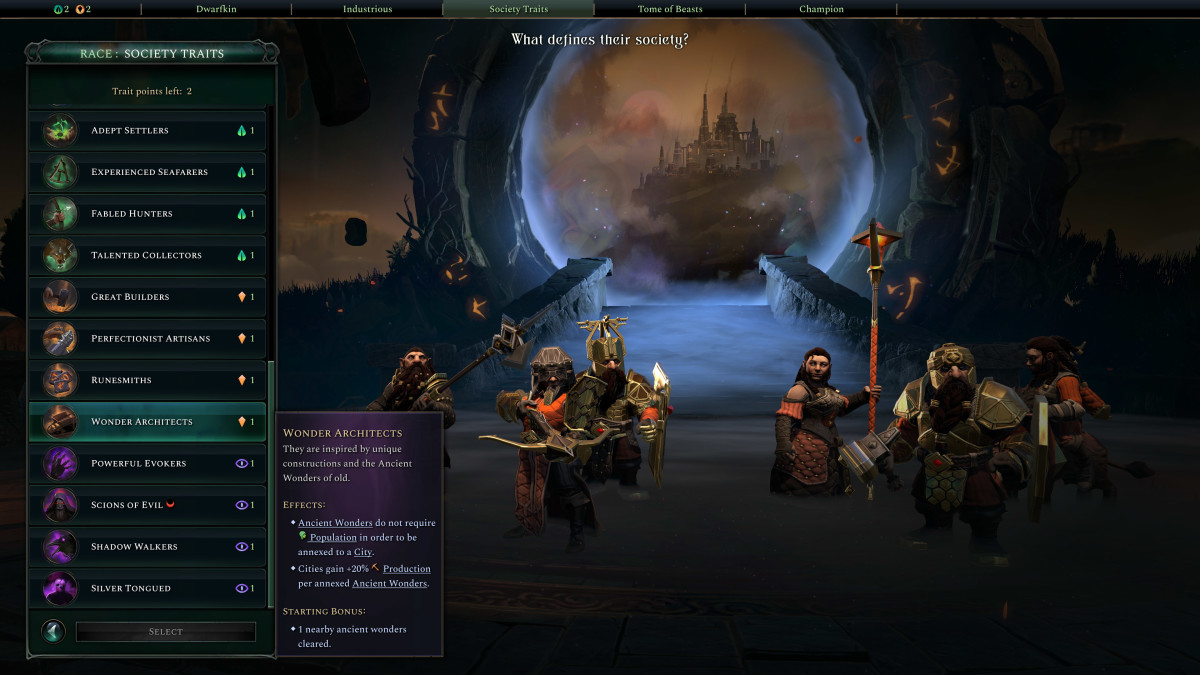
The same is true for the realm you choose to play in. Every world map in the game is randomly generated, even in campaign missions, and you can freely modify and choose additional conditions that will be present during this game – maybe giant blizzards devastate this world and damage any unit without an affinity for ice magic, or the map is littered with giant ruins, or both. Realms can also feature massive underground layers in addition to the surface area, essentially adding a second level to play on and keep in mind for strategies.
That all sounds complicated? Fear not, for Triumph Studios has taken a leaf out of games like Old World and Paradox’ own Crusader Kings 3 and implemented a nested tooltip system, which allows you to simply hover over condition names or abilities, popping up windows explaining what they do. It’s glorious and should really be considered the gold standard in UI design for games such as this one.
You’ll immediately feel at home on the world map if you’ve played a similar title. You have your starting city, which can produce buildings and units simultaneously, and can expand its reach by annexing surrounding provinces as it grows its population. You can decide to build farms, mines, and other infrastructure in these provinces and specialize them further later on. A lot of the buildings and special improvements (from magic schools to wildlife reservations) you can construct are dependent on your culture and your choices during the game when it comes to research.
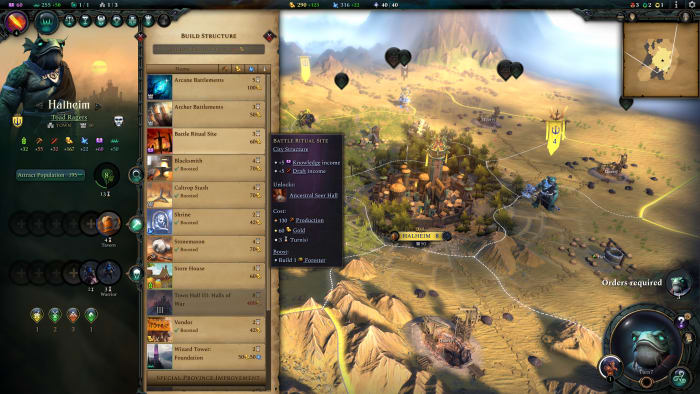
You can build units and buildings in different queues in Age of Wonders 4, making the city management a bit smoother.

Provinces can be claimed as a city's population is going up. Improvements such as farms or mines can always be replaced. Special improvements often benefit from having improvements of a similar type next to it, making careful planning rewarding.

Armies can contain up to six units or heroes. Unlike in the Total War series, armies do not require a hero to lead them.

Up to three armies can support each other in battle in a certain range. Sieges require some preparation time, as your armies break through the enemy's defenses. You may decide to help things along with special siege projects, such as the construction of siege units or undermining the walls.

Camps with NPC armies are dotting the map, guarding resource nodes and treasure.

The underground layer expands the map in many realms, giving you additional space to settle, explore, and outfox your enemy.
But I don’t mean a regular old tech tree like in Civilization. Instead of a tech tree, you get three research choices from a pool that consists of standard tech, culture tech, and tech from your tome of magic. These can be units, buildings, combat spells, or world map spells – some of these can even transform your race’s appearance, letting rocks or icicles sprout from their bodies. After you research three things, you expand the pool by picking another tome of magic. Lots of choices to be made! Combined with your choices during faction creation, choosing different tomes will give your empire more affinity with certain elements, such as shadow, order, nature, and so on.
That, in turn, opens up options in what looks like a skill tree from a Diablo-style game that’s the same in every match. If you’re heavily invested into nature, you could easily go down the entire nature tree, which helps with food generation, population growth, and such. You could also be a bit more versatile and dabble in many different paths of this skill tree. However, the resource you need to purchase skills here is Imperium, which you also need for expanding your empire by founding cities. So, again: choices!
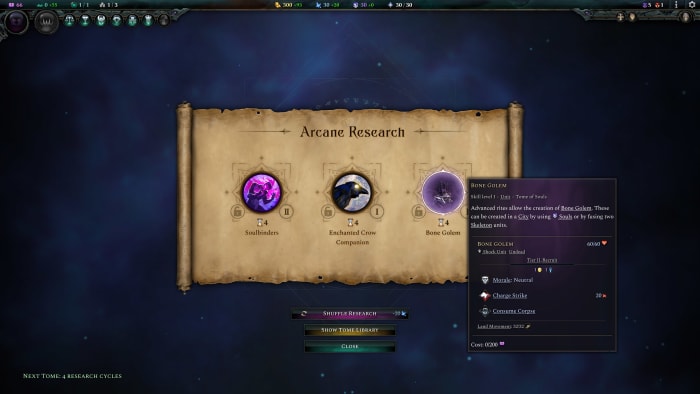
You're always presented with three research options to choose from.

After researching three technologies, it's time to expand the tech pool with another tome.

Transformations alter the appearance of your race and enhances them with different abilities.

These transformations have significant gameplay ramifications and are a great expression of your faction's journey so far.
Choices are important everywhere, and of course that’s also the case when narrative or diplomatic events pop up. How you’ve built your empire so far will sometimes give you alternative options to deal with situations – if a leader from a free city asks you to cover their debts, then sure, you can just pay them, but what if you’re an evil empire that’s deep into shadow magic? Why, you just deal with the creditors on a permanent basis, thereby earning the eternal gratitude of the debtor. Free cities can be won over with gestures such as this, with the end goal being to vassalize and absorb them into your empire without violence. You don’t even need to betray your allies later on, as all three victory conditions (expansion, magic, and elimination) are achievable as an alliance.
This will add their units to a very cool gameplay mechanic called Rally of the Lieges, which allows you to recruit a variety of units from your subjects, enabling you to expand your armies with additional troop types (or more of your own troops, if your subjects are from your own race). You can also explore and secure massive ancient wonders on the world map by defeating their guardians. Annexing these structures through a city or an outpost will add even more units to the Rally of the Lieges, and here’s where you can build truly diverse armies with bone dragons, astral monstrosities straight out of Lovecraft, fire giants, and chirpy little fairies.
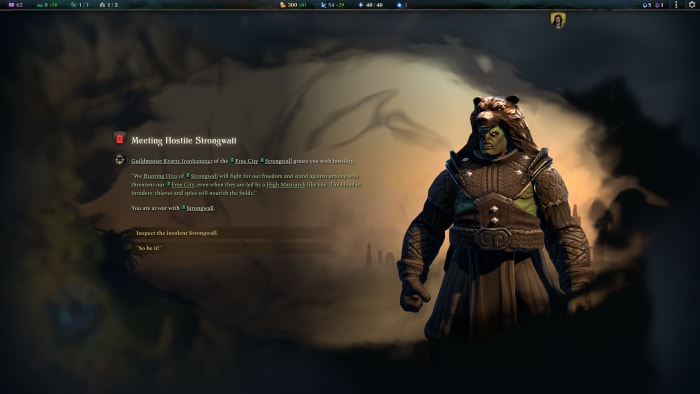
Free Cities exist on most maps and can be vassalized through diplomacy or conquest.

Different types of pacts and trades are available between major factions.

Ancient wonders are basically mini-dungeons you have to clear before being able to gain benefits from them. Mostly this is done by defeating their guardians, but you will sometimes have the option of doing things peacefully.

Once an ancient wonder is annexed by a city or province, you'll gain additional units for your Rally of the Lieges and benefit from the wonder's other effects.
Units, just like heroes, gain XP in combat and become stronger as they level up. They follow a set path of upgrades, though, while you can freely customize your heroes (of which you can have as many as you have cities, as they serve as governors at the same time) as has been the case in previous games. You can invest skill points as they level up, with many of the abilities you can choose being based on their race’s culture. There is also a full gear slot system in the game and you can kit out heroes with powerful magic items, weapons, and mounts. Choices, baby.
Combat, as usual, is turn-based and is played out on separate battle maps, which are lovingly crafted and offer a variety of different terrain types with bonuses and strategic points you can take advantage of. These battles are tactical as ever, with powerful abilities, flanking bonuses, and devastating combat spells all in play. It’s not strictly a rock-paper-scissors system, but as usual some troop types will have traits that make them very effective against certain others, such as polearms against cavalry or monsters. Units become less effective as they lose HP, making healing very important to keep the army’s damage output up.
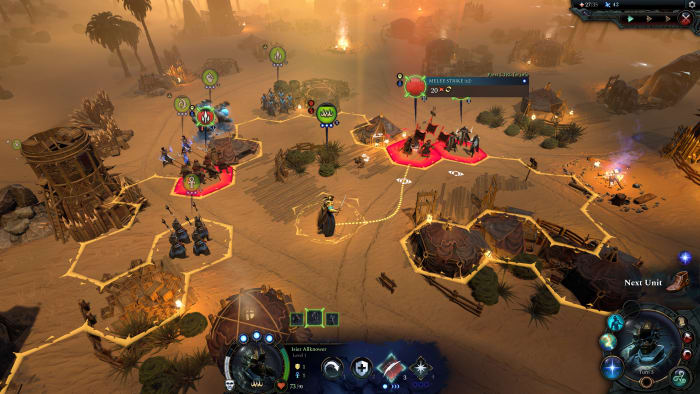
Units have three action points to use in every turn of combat. Up to two may be used for movement.

Flanking provides a great damage bonus, but there are tons of status effects and other considerations you have to keep in mind.

There are many different unit types in the game, from battle mages to skirmishers and shock cavalry.

Your heroes can be outfitted with the items you loot or gain from exploration. You can even sell off the corpses of fallen enemy heroes and thereby gain their gear. Alternatively, you can keep them in your crypt for some bonus income.
Up to three armies with six units each can participate in a single battle, leading to massive fights with absolute carnage going on. The animations are still a bit janky here sometimes, especially when mounted or flying units are involved. There is also some weird camera shaking and a bit of lag when combat spells affecting entire armies go off in massive battles, so there are still some teething issues to be ironed out alongside some false text and other bugs (when I changed the mounts of my heroes to nightmares or unicorns, their models sank into the ground, with only the mount’s head still peeking out).
The AI, overall, is relatively clever. In battle, it will mercilessly focus-fire single units it perceives as vulnerable and always try to go for flanking attacks to maximize damage. When you bunch up your units, it’ll punish you with area-of-effect spells. On the campaign map, it once tried to draw me away from a siege in order to save its city, using my lack of scouts and vision to lay an ambush as I foolishly gave pursuit. I didn’t really see it use any of the overworld magic, though. The level of aggression is pretty high overall, giving you lots to do.
Once you finish a game – victorious or defeated – your actions will gain you XP for the new meta-progression, the Pantheon. The Pantheon contains all the factions and leaders you’ve created and encountered, enabling you to meet them in future games. It also slowly unlocks additional realm and faction creation options, giving you something to work towards.
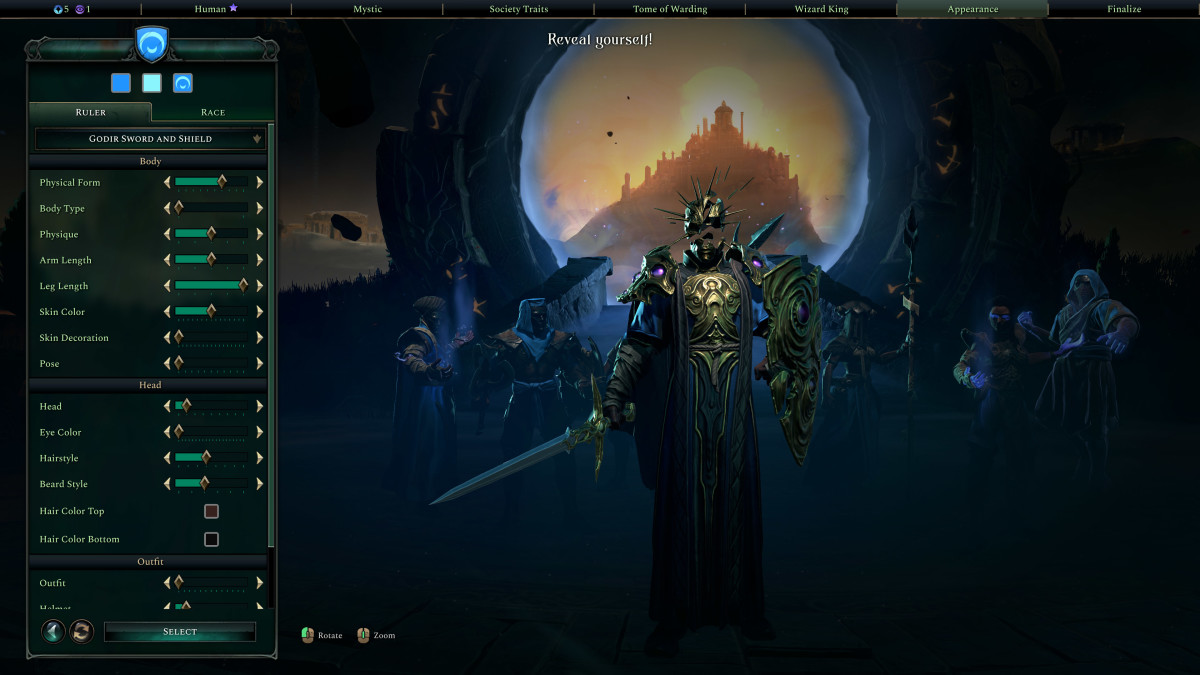
Whether you’re a role-player or a min-maxer, Age of Wonders 4 has much to offer in terms of variety and depth, and this preview build already had me hooked – it looks like Triumph Studios’ streak of success with Age of Wonders is going to continue.
